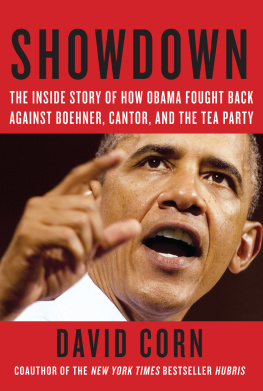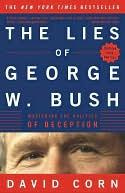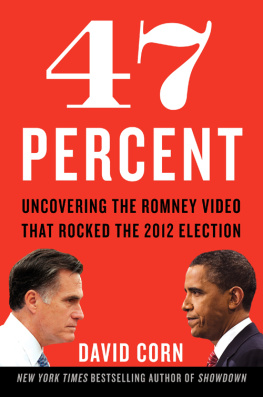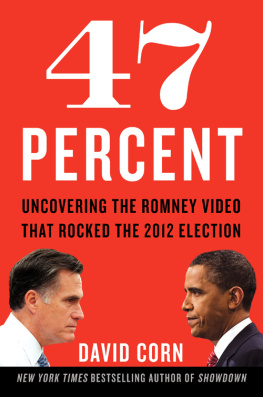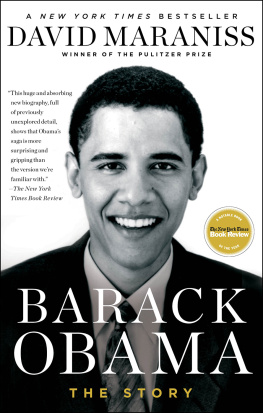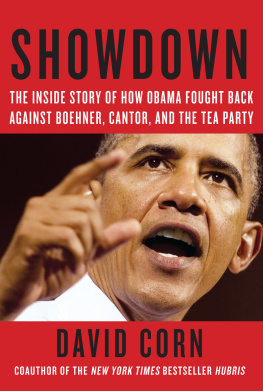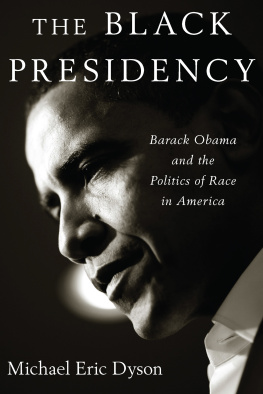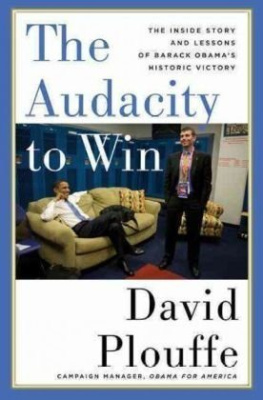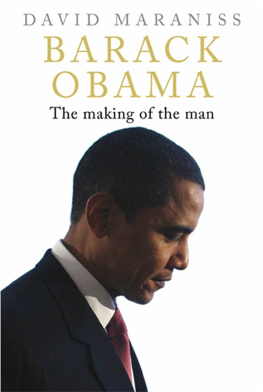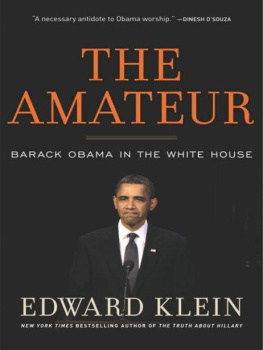SHOWDOWN
The Inside Story of How Obama
Fought Back Against Boehner,
Cantor, and the Tea Party
David Corn

For Welmoed, Maaike, and Amarins
It is silly not to hope.
E RNEST H EMINGWAY , T HE O LD M AN AND THE S EA
Contents
Introduction
Bending the Arc
I T WAS THE FIRST S ATURDAY MORNING OF D ECEMBER 2010. President Barack Obama was in the Oval Office with Vice President Joe Biden, surrounded by his top aides: message guru David Axelrod, press secretary Robert Gibbs, acting chief of staff Pete Rouse, longtime friend and adviser Valerie Jarrett, Treasury secretary Timothy Geithner, National Economic Council chief Larry Summers, budget director Jack Lew, economic adviser Gene Sperling, and others. Once again, the nations chief executive had a tough presidency-defining decision to render.
A month earlier, Obama had experienced what he had accurately dubbed a shellacking at the polls: in the first midterm elections of his presidency, the Republicans had won sixty-three seats in the House of Representatives, seizing control of that body. In the Senate, the GOP had also advanced, cutting the Democrats edge by two-thirds. With unemployment still terribly highthe ongoing result of the financial collapse that had occurred during George W. Bushs administrationthe president and his Democratic comrades had been soundly repudiated by the voters, with an electoral loss greater than many observers had predicted and far worse than Obama and his team had anticipated.
Whatever ideas Obama had for bolstering the still-flagging economy, for funding his preferred public investments for the future, for responding to climate change and other challenges, the House Republicansdominated by the extremist, Obama-hating Tea Party wing of their partywould be there to thwart him.
Yet the president was determined to demonstrate that he was still a leader who could deliver results and, yes, hope. And this weekend morning, he and his aides had gathered in his office to consider a privateand politically riskyproposal the vice president was bearing.
F OR MONTHS, A BATTLE HAD BEEN BREWING OVER A FUNDAMENTAL political and policy question: Should wealthy Americans, at this time of economic peril, continue to receive the generous tax-cut bonus Bush had awarded them in his first term? The Bush tax cuts were due to end on December 31, 2010. If Obama and Congress did nothing, taxes would not only go up on the wealthybut also on middle-class Americans covered by the Bush cuts. That would cause personal hardship for millions of Americans. Worse, Obama and his economic team worried, this would likely damage the tenuous economic recovery that was sputtering along.
Obama had been unambiguous: he favored continuing the lower rates for middle-class earners, and allowing the top-income rates to return to the pre-Bush levels of the 1990s (when the economy was zipping along rather well). Smothering the Bush tax cuts for the well-to-do had been a prominent promiseand a major applause lineduring his 2008 run for the presidency.
But the filibuster-wielding Republicans were not interested in decoupling the middle-class cuts from those for the rich. They wanted to see all the Bush tax cuts extended. They were willing to hold the middle class hostage: no cuts for these Americans, unless the extra breaks for those making over $250,000 a year continuedeven if the tax cuts for the rich would add an estimated $700 billion to the deficit over the coming decade.
Obama knew many of his Democratic allies on Capitol Hill and progressive activists and commentators were spoiling for a fightparticularly in the aftermath of the midterms debacle. Such a confrontation would define the difference between the parties; it could revive Democratic prospects. If it could be won. Obama and his aides had long wondered whether enough House and Senate Democrats would stand fast in this sort of face-off and resist the hackneyed GOP charge that Democrats favored tax hikes. Not likely, Obama and his crew had concluded. They assumed a standoff would probably be lost due to Democratic weakness. (Theres one thing I know, Biden told the president more than once, and thats the Senate, and Ive never seen the Democrats hold all together on a tough tax vote.)
Another factor was shaping Obamas thinking: he was the president of all Americanseven those who had not voted for himnot merely the leader of a political party. He had to take into account the immediate well-being of millions of citizens. He was playing dice with their moneyand he was reluctant to gamble on a fight that could end up with no agreement and, consequently, higher tax bills for middle-class workers. The imperatives of governing, he knew too well, dont always line up with those of politics.
And this dilemma was nothing new. In the first two years of the administration, a former senior Obama White House official later said, there was a split between those who believed in fighting for things even if you know youre going to lose and those who said get the best thing possible passed. As for the president, he really is a stone-cold progressive. But he believes you have to get stuff done.
The president was aware of the rap on him. He realized that if he cut a deal, he would be accused of capitulating to political terrorists, of being too enamored with consensus building, of rewarding the bad behavior of the Republicans who had been trying to derail his presidency from the first moments of his administration. He would be called a sellout.
Polls showed that most Americans supported ending the Bush tax-cut bonus for the most fortunate. But Obama was operating within a conservative and hostile political environment that would soon be more conservative and more hostile to him and his policies. His approval ratings were not strong, and the recent elections had created a sense of political momentum for the opposition.
In previous meetings, Obama had told his aides: if you can outline a path for me in which a bare-knuckles political fight yields a better outcome for the Americans we most care about, Ill choose that course. No one spoke up. They all realized that in a few weeks time, the Republicans would be running the House. Winning a legislative battle over taxesor anything elseat that point would be nearly impossible for the White House.
The president was at the intersection of crosscutting currents. He had an obligation to govern and do right by most Americans. He had a campaign promise to keepone based on a principle he held dear. And he had his own political future to consider, while meeting his obligation to lead the besieged Democratic Party into what appeared to be an uphill 2012 battle.
Progressives could howl about yielding ground to the Republicans on Bushs tax cuts. But the biggest setback for liberals would be a Republican in the White House in 2013. Forging a compromise with obdurate GOPers might well prevent the economy from worseninga necessary condition for Obamas reelectionand improve the presidents standing among the crucial block of independent voters, many of whom had become skeptical of the president and his policies.
Obama remained caught between the two halves of his political base: independents looking for a nonpartisan leader who could stay above the fray and force Washington to do its business and progressives yearning for an ideological champion who would charge into that fray, dispatch his Republican foes, and triumph. Obama could not satisfy both groups at onceespecially while dealing with opponents he publicly likened to hostage takers.
The presidentat this juncturewas leaning toward cutting a deal. But he had an idea: if the Republicans were holding middle-class tax cuts hostage, he would hijack the entire tax-cut fight and exploit it to advance progressive policies that assist middle-class families and juice up the economy. While the rest of the world would be watching a scuffle over the Bush tax cuts, Obama would be maneuvering on a different fielda field, for better or worse, not widely recognized. He was aiming not for a zero-sum political victorydenying the Republicans their cherished tax breaks for the well-heeled. His goal was a victory he couldnt otherwise achieve: more federal support for financially stressed-out Americans and hundreds of billions of dollars in another shot of stimulus for the economy. But, he would tell aides, dont use the s-word. It was as if he had a secret.
Next page
